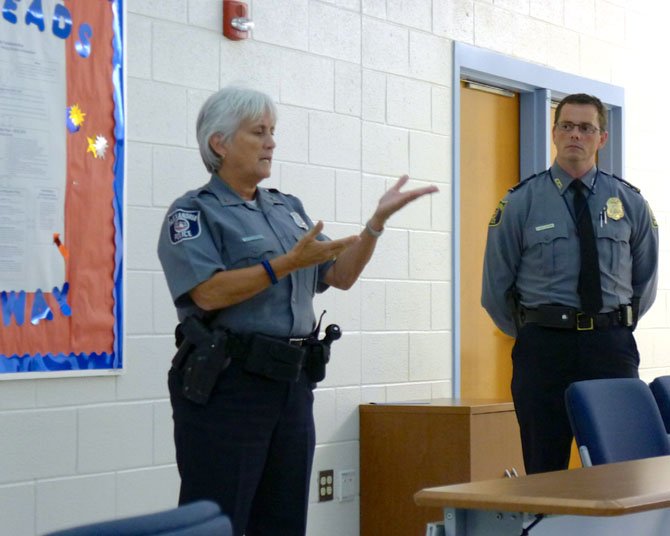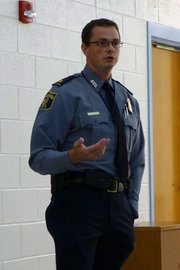Alexandria — Sgt. Courtney Ballantine used to work as a patrol officer, riding around with seven officers day and night, looking out for any signs of crime and responding to 911 calls. He never thought about being surrounded by children until he was assigned as the school resource officer supervisor at Alexandria City Public Schools two years ago. Since then, he has been working with children, telling them what is the right thing to do. And he loves it.
“It’s probably one of my toughest assignments,” Ballantine said at the quarterly meeting of the Substance Abuse Prevention Coalition of Alexandria on Sept. 17. “It’s challenging to ensure the safety and security of the kids. But the beauty of this job is it’s not so much about law enforcement; it’s more about mentoring.”
Founded in 1997 and supported by the City Police Department, Alexandria City Public Schools, City Manager’s Office and City Council, the School Resource Unit is committed to the safety and well being of students. The unit now has five SROs working with Ballantine.
“SROs are very invaluable community ambassadors,” said Margee Walsh, executive director of policy development at Alexandria City Public Schools. “The purpose of having SROs in school is not strictly related to substance use. They’re working on all kinds of activities. Having SROs is saying to folks ‘We can support you in preventing any behaviors that are not good for kids or interfering with learning.’”
Police officers that have three-years experience of working on the street can apply. All officers selected to the School Resource Unit attend a 40-hour training provided by the Virginia Department of Criminal Justice Services — Center for School Safety. The SROs also need to receive additional specialized training on various subjects, including dealing with children who have emotional and educational issues, learning about school policy, laws of search, seizure and arrest on school grounds, how to prevent and deal with an active school shooting incident and many other related topics.
“Don’t come here for the weekends or holidays off,” said Jill Lingle, the SRO who’s been working at G.W. Middle School for 15 years. “You have to like kids. If you don’t, you’re not going to survive.”
As an SRO, most of Lingle’s jobs are mentoring and mediation like a social worker, she said. For instance, a girl came to Lingle because she felt upset for failing a test; a boy from a separated family asked her for help when his mother gave him a cellphone that his father didn’t want him to have. Lingle can help deal with most of the issues children might have. But first of all, she needs to win trust from them.
“First thing you do is to learn their names,” Lingle said. “I mean, you can say ‘Hey, stop!’ But instead, you say ‘Hey, John, stop that!’ They’re like ‘Oh, OK, Officer Lingle.’ Because they know you know them.”
Another technique, according to Lingle, is sitting down and talking to students. At lunch time, Lingle usually goes to the cafeteria, teases students while keeping an eye on surroundings. One day, she wore a Dallas t-shirt in front of a Redskins-fan students, “then that just started it,” she laughed. “I mean, once they see you as a person, they’ll climb up on you, hug you, and they’ll tell you everything.”
When it comes to students involved in drug or alcohol use, carrying weapons, or gang activities at schools, SROs have zero tolerance. SROs talk about law enforcement and consequences students may suffer if they caught in drug use or underage drinking. If students are being suspected, teachers and principals will conduct the administrative search first, and they won’t bring students to SROs until they find actual evidence.
“That’s why this is the hardest job because you need to know when you’re wearing a police hat, an adult hat, or a social worker hat,” Ballantine said. “We’re just constantly switching gears.”
SRO is a difficult job, Lingle said, especially when she sees children struggling. Sometimes SROs can talk students through and help them solve problems. But when they are sent back home, for whatever reason, they show up and struggle again. “It’s like you can’t save all the starfish on the beach,” she said. “That’s very very frustrating.”
Although there are many challenges, Lingle likes the job.
“This is the best job the police department ever gave me,” Lingle added. “Anything working with kids is the future. I mean, you can change kids’ life, teach them to become productive citizens of the society. Then my job is complete.”


